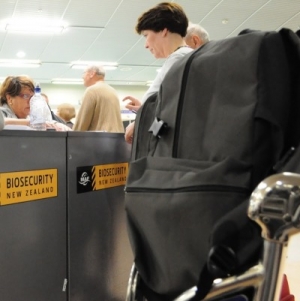Horticulture farmers are delighted with the plan to have visitors to New Zealand paying a share of the costs associated with protecting our nation's borders.
In this week's budget, the Government announced a new border clearance levy will help the Government to protect New Zealand from imported pests, diseases, illegal drugs and contraband and bring us in line with border approaches by other countries.
The levy is expected to take effect from 1 January 2016, and will be around $16 for arriving passengers and around $6 for departing passengers – although the exact amounts will be subject to public consultation.
HortNZ president Julian Raine says the border clearance levy sends a signal to everyone coming here that we don't take biosecurity lightly.
"This announcement backs up what New Zealand's commercial fruit and vegetable growers have been saying for a long time. Passengers need to take some of the responsibility for protecting our primary industries and our native species.
"Every passenger entering this country presents a risk that we must have systems in place to process and check. New Zealand taxpayers should not be covering this cost."
HortNZ will contribute to the public consultation around the setting of the final figure.
"We will be pushing for a rate that appropriately reflects the true cost of the long term sustainable border protection that we need," says Raine.
"The good thing about this levy is that as the number of visitors increases, so will the revenue it generates, to cover the increased cost of processing passengers and the risk they represent," Julian says.
HortNZ notes the suggested $16 levy figure is still a long way off the $58 charged by Australia, a country with similar biosecurity requirements to our own.
HortNZ congratulates the Government for tackling an unpopular issue in a country so focused on developing tourism.
"But the truth is, protecting our agriculture, horticulture and viticulture industries, our home gardeners and our unique flora and fauna, must be our first consideration."
HortNZ also welcomes the additional $24.9 million to be spent on enhancing our biosecurity border protection.



















